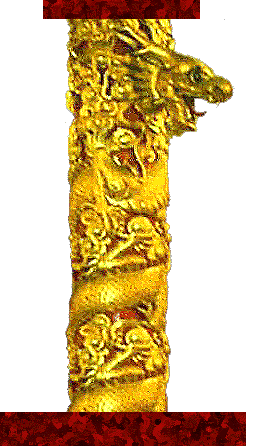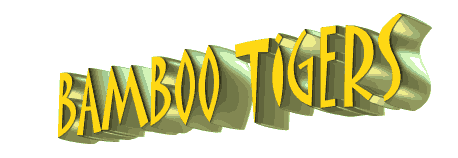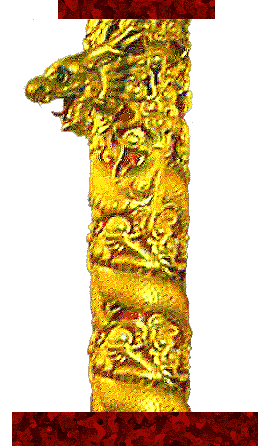| |
Most gang boys in San Francisco formed their first criminal connections in the city's schools or streets and were either born there or had reached America with their families while still too young for Triad association abroad. Those who were older often came with parents whose professional status in Hong Kong allowed their offspring scant criminal exposure. Traditional Chinese control over children was one of the first sacrifices immigrant families made in the New World.
Gan Wah Woo's purported knowledge of Triads first-hand in Hong Kong was unusual. Two reasons were his age upon arrival in the Crown Colony and the fact of his early exposure to criminal elements in a Mainland jail. As a seasoned 14-year-old loner, he was ripe for plucking by Triad recruiters. His courageous escape from Mao's China would have earned him their respect.
By the time gutsy Gan Wah proved himself a yau lung, "swimming dragon," by braving the shark-infested Pearl River in 1974, most of Hong Kong's Triads were no longer the tight, secretive, militant groups of the past, but had become loosely knit bands of thugs still using the Triad principles, minus the 36 Oaths. They were engaged in robbery, burglary, extortion, loan sharking, prostitution and drug dealing. They were themselves dragons swimming through the mainstream of Hong Kong life.
Because of burgeoning overpopulation in Hong Kong, huge housing estates existed with up to 50,000 people living in their blocks. The ground areas and alleys were crowded with shops and street vendors called hawkers. Each block boasted a "mutual-aid" society which was, in effect, a Triad extorting money from the hawkers and residents.
Turf control was paramount. Whenever there were territorial disputes, the Hung Kwan ("Red Poles")--emissaries from the feuding Triads--met in a restaurant in an attempt to mediate the argument. They brought with them contingents of fighters who waited nearby with weapons such as meat cleavers concealed on their bodies. If the mediation failed, the Red Poles rose to their feet as a signal to the fighters. A bloody dui chi ("confrontation") would ensue.
It was common for gang types to carry electronic pagers to prevent law enforcement from getting information from telephone calls. Boys like Gan Wah served apprenticeships covering a variety of responsibilities. They were message couriers in minor drug and extortion deals or made contacts with young girls the Triads wished to enlist for prostitution. (Lun kan, or "gang-rape," was a method used on recalcitrant girls who balked at being sold to call-girl centers for as much as $1,400.) They chased off seat-slashers and trouble makers at theaters that had paid for protection, or, conversely, created disturbances at restaurants that hadn't paid. They were trained in martial arts at gymnasiums and kung fu schools controlled by the Triads.
Gan Wah Woo wasted no time getting into the San Francisco gang scene upon his arrival in late 1976. He immediately adopted the American name "Robert" and insisted that he be called nothing else although, for some reason, many people in law enforcement who came to have dealings with him would always speak of him in retrospect as "Gan Wah," often correcting the error with the afterthought, "...uh...Robert, that is."
He came from an extremely decent family. His grandfather had been an American citizen who had once served in the U.S. Army and had died in the 1960's several years after returning to China. His grandmother had stayed on in Canton as a director of a paper factory. His father taught literature, social studies and physical education at a university there. Both father and grandmother were singled out for persecution by the Communists. While Gan Wah served time in prison after his escape attempt at the age of 12, his father and grandmother managed to get out of China--the father to Hong Kong and the grandmother to America.
His mother and younger sibling, Tony, waited patiently in Canton for the boy's release, but Gan Wah made his daring escape alone, and she was finally granted permission to go to Hong Kong to be reunited with her husband and son. Together, they immigrated to California, where his scholarly father eventually secured employment as a janitor. His long-suffering mother went to work as a seamstress in a garment factory, one of many sweatshops to be found in the alleyways of San Francisco's Chinatown. His grandmother lived in retirement at their modest apartment on Pacific Avenue.
Gan Wah enrolled at Galileo High School, but speaking no English, he wound up dropping out and hanging around the streets. Galileo was, however, a school whose student body was thickly populated with gang kids. Given his nature and background, Gan Wah could not help but associate with them. Tim Simmons had been right about the boy. He was very much a gang kid.
As had the more naive and younger Lincoln Louie a couple of years before, Gan Wah fell in with the Joe Boys. That was how he met Michael "Mouse" Lee, who had by then already moved to San Jose. But his best friend was a tall, husky Chinese, newly accepted into the gang, named Curtis Tam, who also was 17 years old. Meeting Curtis was to mark a turning point in Gan Wah's future.
Gan Wah became so quickly identified with the Joe Boys that it was only a matter of months after setting foot in California that he ran up against the Wah Ching in a beef over turf violation. On that occasion, he was so savagely beaten up by Hotdog Louie in front of a Wah Ching hangout in Chinatown, the Sun Sing Theater, that he vomited blood. There was no turning back after that. In San Francisco, he would be forever marked as "one of them goddamn jellybeans!"
The Joe Boys, as an outside-Chinatown group, were constantly at odds with the Wah Ching, who ranked among the territorial kings of Grant Avenue. The scuffle with Hotdog Louie was no ordinary disagreement between high-schoolers. It represented the waging of war.
Gan Wah, who from his bed in San Francisco General Hospital would admit to police no criminal association and confirmed Mouse Lee's sketchy account of the shooting in March, had hardly stated the whole truth. Much later, he confessed a different version:
"Mouse and I went to the movies that night at the Sun Sing Theater. After the show, we walked east on Jackson. Then, in front of the Great Eastern Restaurant, two carloads of Wah Ching pulled up and started shooting. Mouse and I ducked behind some cars and managed to get to his car and take off. We got stopped by a traffic light at Battery and Clay and saw that the Wah Ching were right behind us. They jumped out and came at us with their guns firing. That's when they got me."
A Wah Ching in police captivity on another charge would recount yet another version:
"I was eating dinner with some of the guys at the Kum Hon Restaurant, next door to the Great Eastern. Somebody observed a green car pull up in front of one of our cars outside. A couple of us went out there. It was some Joe Boys. I recognized Melvin Yu and saw someone else in the back seat. Melvin yelled at me in Chinese, 'What the fuck are you looking at?' I then observed a gun in Melvin's hand. It appeared to be an automatic and was covered with a cloth. He pointed it in my direction. He was three car lengths away from me. I heard a shot, and then I started running. I ran up the alley. After awhile, I came back. The Joe Boys were gone, and one of our cars was, too."
Conflicting stories were the problem when trying to sort out the truth in police work associated with the Chinese youth gangs. There was always a Wah Ching story, a Joe Boy story, a Hop Sing Boy story, a Dai Ben story, a Kit Jai story--as many stories as there were gangs. They never matched, and no one ever told the full truth.
Although Gan Wah never admitted to it, police deduced that he and his Joe Boy companions had set out on safari to bag a few Wah Ching in revenge for the beating he got from Hotdog in front of the Sun Sing Theater. These sorties were common among all the gangs. The shots fired near the Great Eastern and the Kum Hon Restaurants no more than angered the quarry. The Joe Boys took off with the object of getting as far from Chinatown as fast as they could. The erstwhile intended victims in the Wah Ching gang, now bent on their own revenge, caught up with the fleeing targets in a line of traffic stopped for a red light at Battery and Clay--one block from the high road to freedom, the Bayshore Freeway. That was where and why Gan Wah got shot in the chest.
As if it were not enough that the gangs, by lying, obstructed the cause of even their own justice in wars against each other, there were the eyewitnesses like the lady who probably saw much more than she dared tell Patrolman Del Torre in front of the Great Eastern Restaurant--not to mention others who disappeared from the scene. Typically of Chinatowners, they scuttled away into the darkness behind the wall of silence.
There was the case of a robbery sometime afterward in which Gan Wah was clearly implicated as the perpetrator. No one could mistake the boy with the steely eyes and the two gold front teeth. His distinctive appearance offered "a dead-bang I.D.," as Tim Simmons was fond of saying in reference to the boy. Two Chinese eyewitnesses came forth to make a positive identification of Gan Wah in that case. One hard look from the "swimming dragon" convinced them that the cops had the wrong guy.
But Gan Wah Woo did have payments to make for whatever his true role may have been in the circumstances that led him to Dr. Horn at Mission Emergency. The bullet that remained in his body liked to travel around, and when it did, Gan Wah had to lie down in agony wherever he was--even on the sidewalks he had wanted to rule as a member of the Joe Boys Gang.
| |
|









